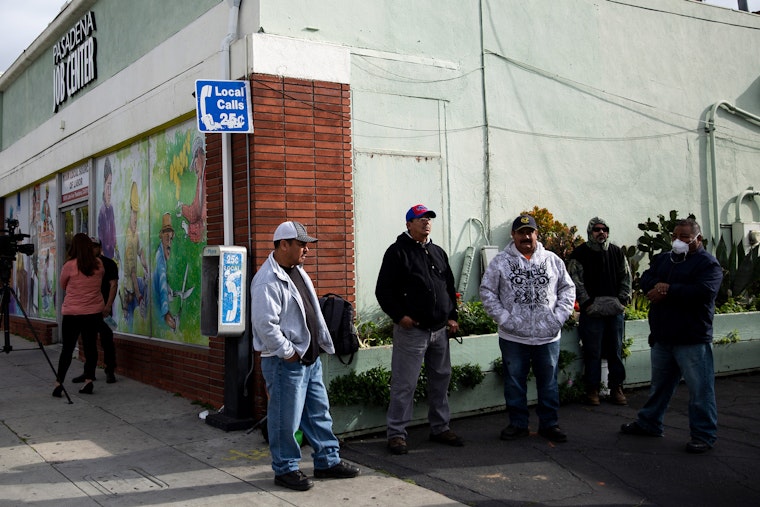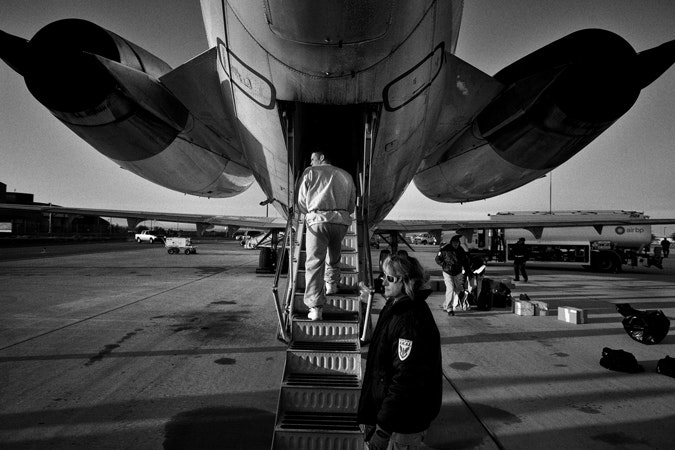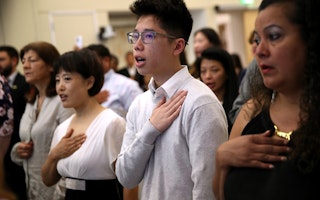What the U.S. Still Owes Undocumented Workers
By Gregory Maniatis

Soon after the pandemic struck the United States, in March 2020, the term “essential workers” entered the popular lexicon. As U.S. communities went into lockdown and hospital intensive care units reached capacity, Americans appreciated—perhaps as never before—that health care staff, day laborers on farms, gig drivers, meat packers, and building maintenance staff were the backbone of our communities.
Among these essential, often low-paid workers, a disproportionate share are immigrants, including millions of undocumented ones. By continuing to go to work every day, they risked their lives to keep countless others healthy, safe, and fed.
But as deeply committed as these neighbors are to us, our own commitments to them fall far short. When the U.S. Congress passed the first emergency relief legislation in April, known as the CARES Act, it not only excluded undocumented immigrants from receiving emergency aid. It also froze out more than 5 million American citizens, including over 2 million children, merely because they share a household with an undocumented immigrant (or with someone who does not have a Social Security number).
What’s more, and for similar reasons, tens of millions of U.S. residents are ineligible for federal pandemic aid. This means that countless workers on the pandemic frontlines live without health care, paid leave, or savings of their own.
In mid-March, hoping to mitigate the suffering of these neighbors, the Open Society Foundations committed $20 million to New York City, to establish a fund for undocumented immigrants and other workers excluded from federal aid. In subsequent months, this direct cash assistance was distributed to around 20,000 excluded workers and their families through over 30 community-based organizations.

By early April, we had reached out to mayors in more than a dozen other U.S. cities to see if they would be willing to launch similar funds. Every single one was enthusiastic; in fact, several already had started down this path. They recognized the invaluable role immigrants play in their communities. They also knew that their cities could not function if they excluded residents from their emergency response. In a pandemic, after all, no one is safe unless everyone is safe.
Over the course of spring and summer, Open Society helped finance similar funds in 30 cities, states, and counties around the country, backed by an additional $12 million commitment. We and our partners worked with even more cities, states, and counties that also have launched their own funds to support immigrants. In all, over 60 cities, states, and counties have created funds for their most vulnerable residents, including undocumented people.
- Chicago, Illinois
- Denver, Colorado
- Atlanta, Georgia
- Philadelphia, Pennsylvania
- Pittsburgh, Pennsylvania
- Los Angeles, California
- Tucson, Arizona
- Baltimore, Maryland
- Boston, Massachusetts
- Harris County, Texas
- Dallas, Texas
- Fairfax County, Virginia
- Charlottesville, Virginia
- New York City, New York
- Washington, D.C.
- Detroit, Michigan
- New Orleans, Louisiana
- Richmond, Virginia
- Chattanooga, Tennessee
- Birmingham, Alabama
- Oklahoma City, Oklahoma
- Dayton, Ohio
- Austin, Texas
- Salt Lake City, Utah
- Louisville, Kentucky
- Nevada
- Connecticut
- Rhode Island
In establishing this initiative—which we are calling the Emma Lazarus Campaign, in honor of the author of the poem that adorns the base of the Statue of Liberty—we and our partners knew that private donors could only meet a tiny fraction of the need that existed. Simply put, reducing the suffering and hunger felt in immigrant communities would require federal and state assistance. So, in launching the funds, we argued that it was inexcusable for government to exclude immigrants from the pandemic response, and that only with public funding could we meet the enormous need in the country. Several local governments and other partners have indeed deployed public funds.
This work was challenging. Donors need to be sure that money is being used as intended—not siphoned off by those who claim to represent people they don’t in fact represent. Meanwhile, aid recipients need to be assured that the information collected about them cannot be seized by immigration enforcement, under a federal administration that has spearheaded aggressive deportations by the Immigration and Customs Enforcement Agency.
There are other legal challenges as well—making sure, for instance, that the money is distributed in ways that don’t amount to a charge on the public purse, which under U.S. immigration law can be used to invalidate any eventual application for citizenship.
Most of the local governments involved in this work have never done anything like this before. In addition, local political leaders also know that undocumented workers don’t vote—and that directing funds to assist them opens them up to attack from vocal xenophobic and nativist opponents.
In addition to local governments, we are supporting other pioneers who are innovating ways to support vulnerable workers. Most notably, the National Domestic Workers Alliance has been running an online mutual aid system for its largely female and mostly undocumented workers—offering them medical insurance and other benefits in exchange for a five dollars a month membership. In turn, it uses a cash distribution and collection platform, Alia, that provides a potential foundation for other initiatives. Open Society has committed $2 million to the National Domestic Workers Alliance’s COVID-19 emergency fund, and a further $2.7 million to support the expansion of the Alia platform.
Our hope is that this drive to respond to the pandemic ultimately sets up systems that help to protect the health and well-being of these workers in the longer term. Even after the U.S. manages to eventually deliver the deep reform of its immigration system that it clearly so desperately needs, undocumented workers will likely remain part of life in the U.S. It’s time for the country to acknowledge their role—and its responsibilities.

Gregory Maniatis is a director of Programs at the Open Society Foundations.


